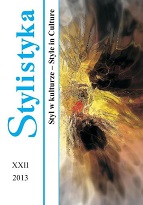OBLĘŻENIE I OBRONA SARAGOSSY JÓZEFA MROZIŃSKIEGO A TRADYCJA NARRACJI HEROICZNEJ
The Siege and Defence of Saragossa by Józef Mroziñski and the tradition of heroic narrative
Author(s): Marzanna UździckaSubject(s): Language and Literature Studies
Published by: Uniwersytet Opolski
Keywords: heroic narrative; artistic style; linguistic picture of the world; attribution; cultural context
Summary/Abstract: The detailed studies conducted in the article are based on the issue of heroic narrative. Heroic narrative is a type of writing concerning serious subjects significant to the Polish identity, cultural context and national history. These notions are implemented in language through linguistic features showing pathos and loftiness, uncommon tragedy, violence and vividness of the presented characters and historical events. The aim of the study was to establish a set of features determining the way heroic narrative is written. These features are mainly implemented by literary works and by texts which are strictly literary, but their author was the direct participant of events which were crucial for a given community. The basis of the article is Oblê¿enie i obrona Saragossy w latach 1808 i 1809, ze wzglêdem szczególniejszym na czynnooeci korpusu polskiego. The text can be classified as fiction because its author, Józef Mroziñski, was not a writer but a soldier (a captain) taking part in the military actions described in the text. The idea of “linguistic picture of the world” has been used in the article. It has allowed showing how a direct participant of the battle interprets the reality through the language, which features of people and things he notices and emphasizes and to what extent the linguistic features he uses are typical of heroic narrative. The main tool of description was the notion of attribution, which is understood as a semantic category covering different kinds of features ascribed to the analysed object. The conducted studies have shown that when talking about heroes and crucial historical events one does not always use the features of heroic narrative typical of literary tradition and Polish culture. Józef Mroziñski depicts heroism by using non-traditional features such as: in the subject matter – a deep reflection on the tragic situation of both people who lived in a besieged city and the besieging soldiers, in the language – meticulous, objective and truthful style, concerning lexis describing facts without assessment, interpretation and selection, emphasizing the tragedy of war. Another typical feature of Mroziñski’s style is accumulation of verbs and verbal phrases; in the text organisation – numbers of enumerating phrases referring to tragic effects of war and the heroism of fighting people.
Journal: Stylistyka
- Issue Year: 2013
- Issue No: XXII
- Page Range: 47-64
- Page Count: 17
- Language: Polish

